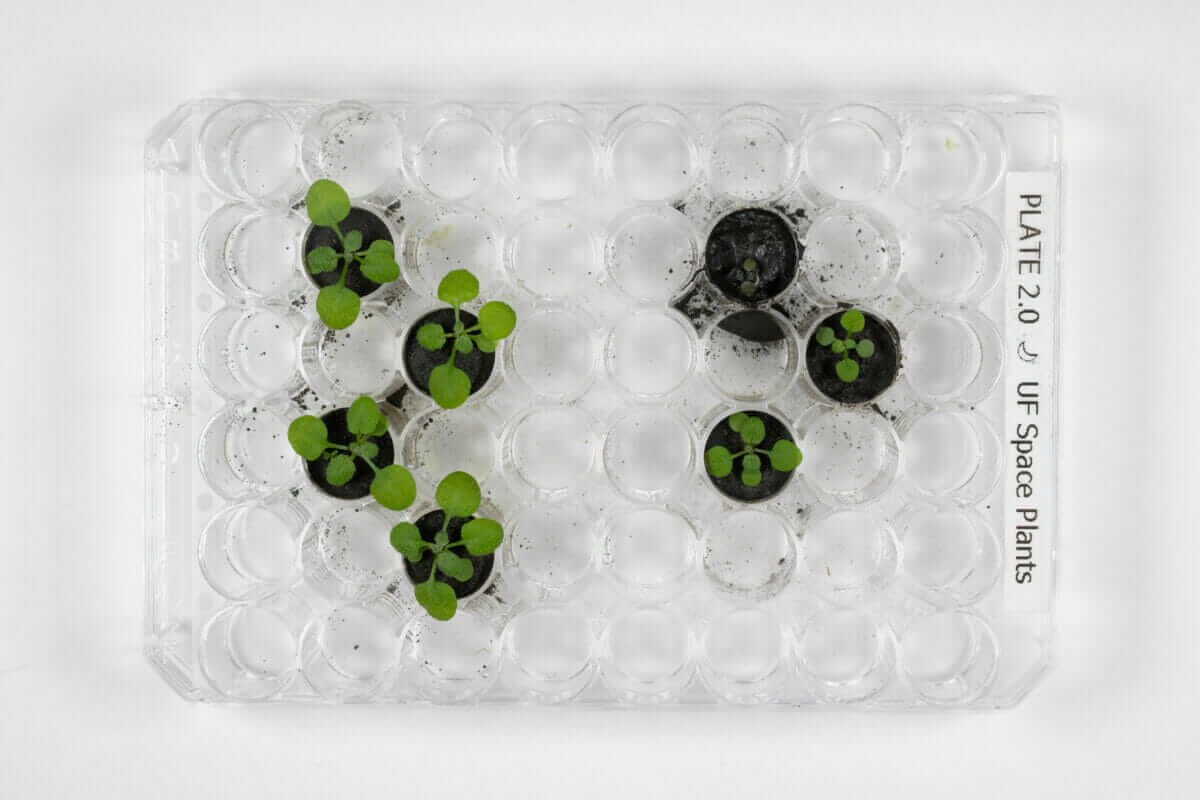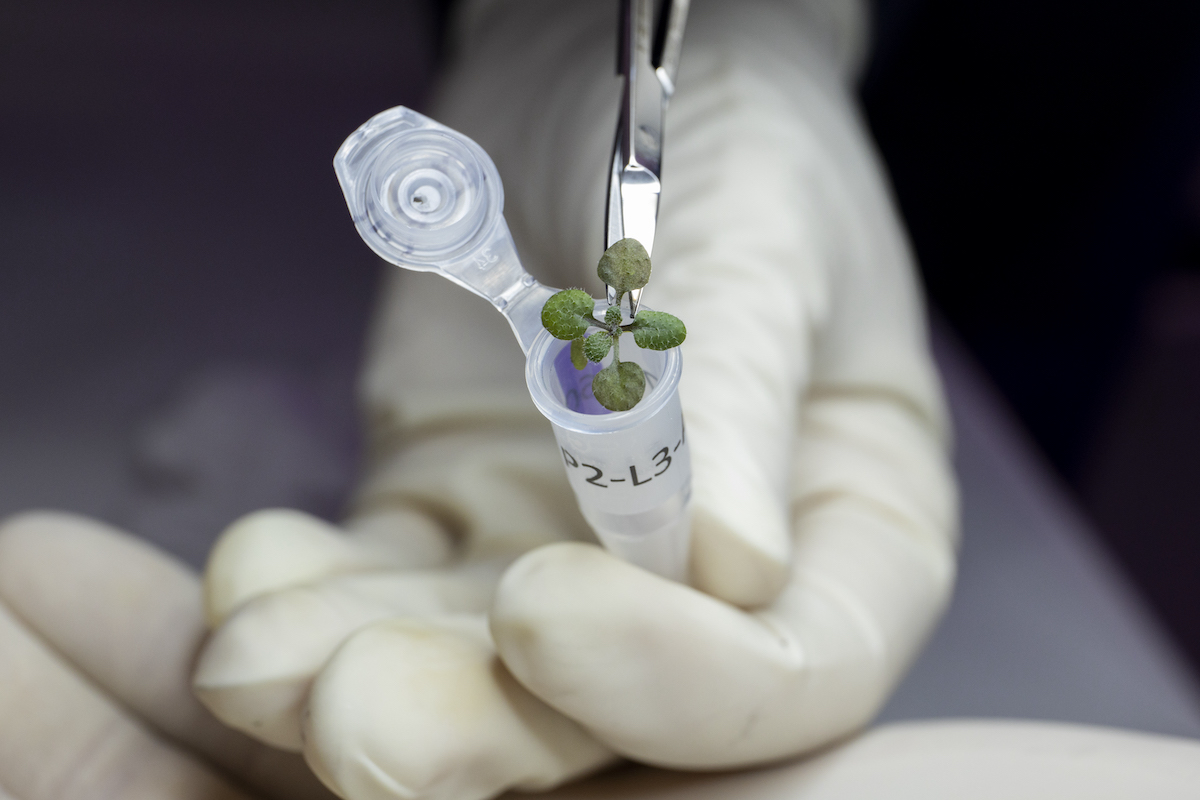Scientists Grow Plants in Moon Soil for the First Time
The seeds grew in lunar soil collected during Apollo 11, 12 and 17 missions decades ago.
Scientists Grow Plants in Moon Soil for the First Time
The seeds grew in lunar soil collected during Apollo 11, 12 and 17 missions decades ago.

Plants grown in soil from the moon.courtesy of UF/IFAS photo by Tyler Jones.
Growing greens just went lunar.
For the first time, scientists have successfully grown plants using lunar soil—known as lunar regolith—collected from past moon expeditions.
Scientists at the University of Florida conducted the experiment using a well-studied plant known as Arabidopsis thaliana, a crop native to Eurasia and Africa and a relative of the mustard green and other vegetables such as Brussels sprouts, broccoli and cauliflower. They didn’t even know if the seeds would germinate.
In a paper published May 12 in the journal Communications Biology, researchers explained how they conducted the experiment using teaspoon-sized samples of regolith— collected from Apollo 11, 12 and 17 missions—alongside control earth soil and a lunar soil simulant made from volcanic ash. Each plant was allotted only a gram of the lunar soil for the study.
“After two days, they started to sprout,” said Anna-Lisa Paul, a professor in Horticultural Sciences at the University of Florida, according to NASA. “Everything sprouted. I can’t tell you how astonished we were. Every plant, whether in a lunar sample or in a control, looked the same up until about day six.”
After those initial six days, according to the paper, it became clear that the nutrient-poor lunar soil wasn’t quite as hospitable of a growing environment, as the plants grown in the control group grew more robust than those in the regolith. The lunar soil-grown plants were slightly stunted both in their root systems and leaves. Nonetheless, all the plants survived until researchers harvested them after 20 days—right before they went to flower.

For the next steps in the experiments, scientists ground up the plants to study their biological systems. This revealed what was apparent during the growing period, that the plants rooted in lunar soil were under stressed conditions in relation to the controls. But the study was still deemed a success.
The groundbreaking research, part of the Apollo Next Generation Sample Analysis Program (ANGSA), an “effort to study the samples returned from the Apollo Program,” has serious repercussions for future areas of study.
“This research is critical to NASA’s long-term human exploration goals as we’ll need to use resources found on the Moon and Mars to develop food sources for future astronauts living and operating in deep space,” said NASA administrator Bill Nelson. “This fundamental plant growth research is also a key example of how NASA is working to unlock agricultural innovations that could help us understand how plants might overcome stressful conditions in food-scarce areas here on Earth.”
Follow us
This work is licensed under a Creative Commons Attribution-NoDerivatives 4.0 International License.
Want to republish a Modern Farmer story?
We are happy for Modern Farmer stories to be shared, and encourage you to republish our articles for your audience. When doing so, we ask that you follow these guidelines:
Please credit us and our writers
For the author byline, please use “Author Name, Modern Farmer.” At the top of our stories, if on the web, please include this text and link: “This story was originally published by Modern Farmer.”
Please make sure to include a link back to either our home page or the article URL.
At the bottom of the story, please include the following text:
“Modern Farmer is a nonprofit initiative dedicated to raising awareness and catalyzing action at the intersection of food, agriculture, and society. Read more at <link>Modern Farmer</link>.”
Use our widget
We’d like to be able to track our stories, so we ask that if you republish our content, you do so using our widget (located on the left hand side of the article). The HTML code has a built-in tracker that tells us the data and domain where the story was published, as well as view counts.
Check the image requirements
It’s your responsibility to confirm you're licensed to republish images in our articles. Some images, such as those from commercial providers, don't allow their images to be republished without permission or payment. Copyright terms are generally listed in the image caption and attribution. You are welcome to omit our images or substitute with your own. Charts and interactive graphics follow the same rules.
Don’t change too much. Or, ask us first.
Articles must be republished in their entirety. It’s okay to change references to time (“today” to “yesterday”) or location (“Iowa City, IA” to “here”). But please keep everything else the same.
If you feel strongly that a more material edit needs to be made, get in touch with us at [email protected]. We’re happy to discuss it with the original author, but we must have prior approval for changes before publication.
Special cases
Extracts. You may run the first few lines or paragraphs of the article and then say: “Read the full article at Modern Farmer” with a link back to the original article.
Quotes. You may quote authors provided you include a link back to the article URL.
Translations. These require writer approval. To inquire about translation of a Modern Farmer article, contact us at [email protected]
Signed consent / copyright release forms. These are not required, provided you are following these guidelines.
Print. Articles can be republished in print under these same rules, with the exception that you do not need to include the links.
Tag us
When sharing the story on social media, please tag us using the following: - Twitter (@ModFarm) - Facebook (@ModernFarmerMedia) - Instagram (@modfarm)
Use our content respectfully
Modern Farmer is a nonprofit and as such we share our content for free and in good faith in order to reach new audiences. Respectfully,
No selling ads against our stories. It’s okay to put our stories on pages with ads.
Don’t republish our material wholesale, or automatically; you need to select stories to be republished individually.
You have no rights to sell, license, syndicate, or otherwise represent yourself as the authorized owner of our material to any third parties. This means that you cannot actively publish or submit our work for syndication to third party platforms or apps like Apple News or Google News. We understand that publishers cannot fully control when certain third parties automatically summarize or crawl content from publishers’ own sites.
Keep in touch
We want to hear from you if you love Modern Farmer content, have a collaboration idea, or anything else to share. As a nonprofit outlet, we work in service of our community and are always open to comments, feedback, and ideas. Contact us at [email protected].by Shea Swenson, Modern Farmer
May 20, 2022
Modern Farmer Weekly
Solutions Hub
Innovations, ideas and inspiration. Actionable solutions for a resilient food system.
ExploreExplore other topics
Share With Us
We want to hear from Modern Farmer readers who have thoughtful commentary, actionable solutions, or helpful ideas to share.
SubmitNecessary cookies are absolutely essential for the website to function properly. This category only includes cookies that ensures basic functionalities and security features of the website. These cookies do not store any personal information.
Any cookies that may not be particularly necessary for the website to function and are used specifically to collect user personal data via analytics, ads, other embedded contents are termed as non-necessary cookies.
Wow!What a fabulous invention!
A truly desirable result. Research results are always a matter of concern
I hate that they call this crap “pro cut”, no professional gunfighter would use a slide like that.
It provided helpful recommendations and saved me time and stress.
I benefited from this site from various articles and topics. Thank you to everyone for their efforts, and thanks to the author of the article
Seems strange that plants can grow in moon soil they should have released a video at least so we saw it with timelapse.